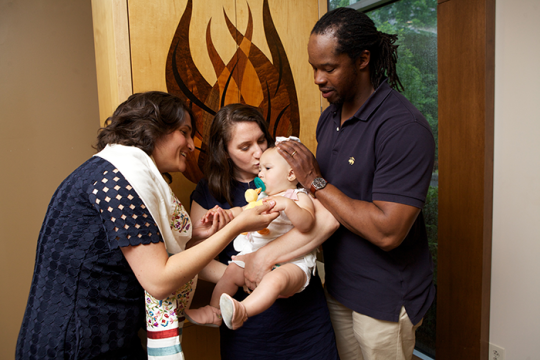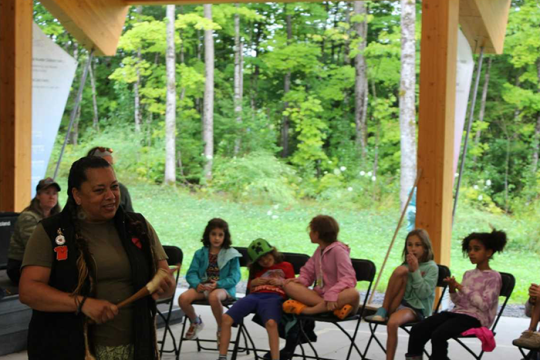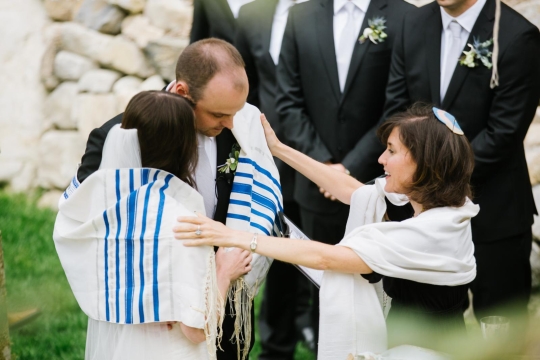
I had the most enriching privilege of being a member of a panel discussion at the WRJ Assembly in Orlando, FL, last month titled “The Gatekeepers: Women Embracing Interfaith Families.” My fellow panelists were InterfaithFamily CEO Jodie Bromberg, WRJ Pacific District First Vice President Judith Shor Ning, and InterfaithFamily Board member Dr. Ruth Nemzoff. Each woman brought a unique perspective and wonderful wisdom to the discussion, and I was humbled to be among them.
We took turns sharing our experiences of being part of an interfaith family. For me, the challenge and the work began before the actual family was formed, as I believe it should if you want that family to succeed and be fruitful. My husband, a Turkish Muslim, and I, an American Jew, had the challenge of different religions and cultures.
However, similar backgrounds don’t guarantee a successful relationship. Both of us were fortunate enough to have families who realized this. Still just engaged, Shemsi lived with my mother and siblings while I finished my last semester at college. My soon-to-be mother-in-law was the embodiment of unconditional acceptance in her profound statement: “If you love her, then she’s our daughter.”
An interfaith couple must be of one mind in their plan for the religious upbringing of their children. Both parents should be involved as equally as possible. The parent of another faith need not convert, but should become educated in order to support the children in their Jewish household. Even if there are no children in the family, be accepting and inclusionary. Find meaningful ways for every person to participate in Jewish events shoudl they wish to do so, and then thank them for being involved.
Hanukkah is a golden opportunity for creativity and learning in your celebration. When children ask about Christmas, explain that there is nothing wrong in joining in the celebration of your friend’s or Christian relative’s holiday. Return the kindness and invite friends and relatives of other faiths to a latke-making party and teach how this connects to the historic and religious significance of Hanukkah. Recite the candle lighting prayers in both Hebrew and English, or discuss the similarities in why or how Hanukkah and other faith-based holidays are celebrated.
A “learner’s service” can be a great way to reach out to interfaith families. Congregants from any background can learn toegtehr, without anyone being singled out or made to feel awkward. Work to find more welcoming language to refer to these members. How would you like to be known as the “non-Christian” or the “non-Muslim?” Conduct inclusionary programs without using the label “interfaith.” In your publicity you might use the terms “our friends of other faiths” or “all those who seek to deepen their knowledge.”
There are many creative ways to include all members of an interfaith family and those connected to them: Put PJ Library books in the pews for services, invite young members to lead an interfaith discussion group, ask new leaders to organize joint community mitzvah projects between the temple and other religious institutions, or host an intergenerational cooking program that connects the food to its Jewish tradition or history.
Above all, make sure everyone has a role and is part of the conversation. Don’t send a mixed message and don’t turn people away. Embracing interfaith families is not only right because we should give everyone their due of human dignity, but also because it helps us ensure the survival of Judaism.
How does your family discuss interfaith issues during the holiday season? Share your experiences and programming ideas in The Tent!
Have something to say about this post? Join the conversation in The Tent, the social network for congregational leaders of the Reform Movement. You can also tweet us or tell us how you feel on Facebook.
Related Posts

Interfaith Inclusion in Our Communities

Not Just a Checkbox: Diversity, Equity, & Inclusion Actions at URJ Camp George
